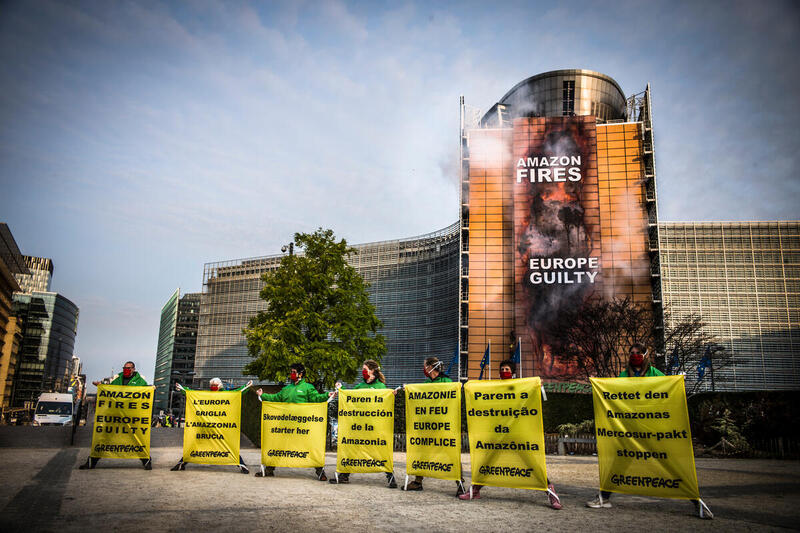Kort inden FN’s Biodiversitetstopmøde COP15 begynder i morgen i Montreal, satte EU sent i går aftes punktum for forhandlingerne om en ny historisk lov, den første af sin slags, der skal gøre op med EU’s globale aftryk på skovrydning.

Kristine Clement, kampagneleder for landbrug skov og natur i Greenpeace, siger (mobil: 52191291):
“Den nye EU-lov får motorsave til at forstumme og er en vigtig historisk sejr for verdens skove. Nu bliver virksomheder endelig stillet til ansvar for at sikre, at de varer, de importerer og sælger i EU, ikke må have været med til at rydde skov. Det er godt nyt også for danske og europæiske forbrugere, der snart trygt vil kunne købe de fleste varer ind uden at risikere at få skovrydning med hjem i indkøbskurven.”
“Dansk mælk og svinekød kan desværre fortsat have en grim bismag af naturødelæggelser, for Brasiliens skovsavanne Cerradoen, hvor størstedelen af Europas import af sojafoder kommer fra, er ikke blevet omfattet af loven. Det er et alvorligt hul i loven, som vi opfordrer den kommende danske regering til at kæmpe for at få lukket snarest. Vi opfordrer samtidig til en fuld udfasning af importen af sojafoder i 2030, for dansk landbrug skal ikke lægge beslag på andre landes landbrugsjord til at fodre dyr.”
….
Greenpeace EU press comment – for immediate release
Chainsaws fall silent: EU agrees deforestation law
Brussels, 6 December 2022 – In a world first, companies will have to show that their products have not contributed to deforestation if they want to sell them in the EU, after negotiations on a new law finished in Brussels. Representatives from the European Parliament and national governments finalised the law that will require companies to trace their commodities back along the supply chain to the plot of land, and prove that forest was not recently cleared, or face fines. The new EU law was concluded ahead of the COP15 meeting of the UN biodiversity convention in Montréal, Canada, to start tomorrow, and expected to deliver a global deal for nature.
Greenpeace warned that while the law will protect forests, the human rights of Indigenous People will receive only “flimsy” protection, and other nature like savannahs and peatlands are not covered.
The law will apply to companies selling soy, beef, palm oil, wood, rubber, cocoa and coffee, and some derived products like leather, chocolate and furniture. Currently, people in the EU have no guarantee that the items in their shopping baskets are not the product of deforestation.
Greenpeace EU spokesperson John Hyland said: “Just one day before the UN Biodiversity COP15 is starting in Montréal, the EU has revealed a major breakthrough for forests, and for the people who fight for their protection, amping up the pressure on the convention to deliver a global deal to reverse nature loss. This law applicable to all 27 EU member states will make some chainsaws fall silent and stop companies profiting from deforestation. But EU governments should be ashamed of themselves for adding loopholes for their own logging industries, and giving flimsy protection for the rights of Indigenous People who pay with their blood to defend nature. In the coming years, EU governments must broaden their focus to protect nature as a whole, not just forests, and to stop the companies destroying nature not only from accessing the EU market but also getting loans from European banks. Now, all eyes are on our ministers and delegations at COP15 to reach a global deal for nature.”
Under pressure from the European forestry sector and the Canadian government, EU governments secured a loose definition of “forest degradation” – essentially a loophole that allows continued unsustainable logging of natural forests. National governments also resisted a push by the European Parliament to include respect for international human rights law in the deforestation law, and the deal agreed only requires the right to free, prior and informed consent for Indigenous People to be respected if the producing country guarantees that right.
The European Parliament pushed unsuccessfully for the law to protect “other wooded land” on top of land that is technically considered forest, but this will be reconsidered in a review within one year, and the protection of other ecosystems such as savannahs and wetlands within two years.
A proposal by the European Parliament to include European financial institutions in the new law did not ultimately make it into the final agreement. The proposal would have required companies to show their products were deforestation-free not only in order to sell on the EU market, but also to receive financing from banks based in the EU. This proposal will however be reconsidered in a review of the law within two years. The European Parliament had also been pushing to include maize in scope of the law, which is also linked to significant forest destruction. Extending the law to cover maize and biodiesel will be considered as part of this review process.
Next steps
The European Parliament will rubber-stamp the new EU deforestation law in a vote in its plenary session, and national governments will give formal approval during a meeting of ministers. These formalities will likely take place early next year.
Contacts:
John Hyland, Greenpeace EU spokesperson: +32 (0)471 75 89 85, [email protected]
Greenpeace EU press desk: +32 (0)2 274 1911, [email protected]
